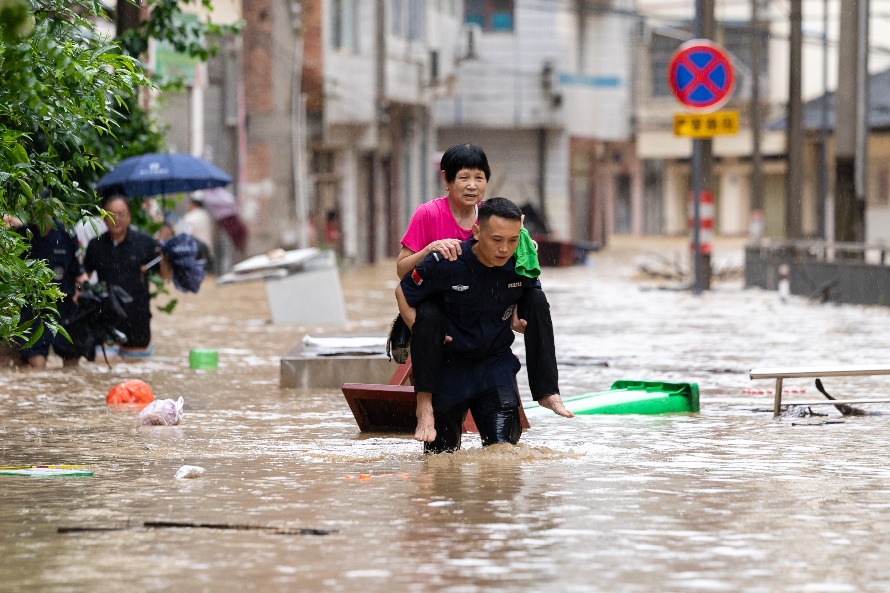Kazan holds the key


By focusing on reforming the global financial system, building new alliances and tech innovation, BRICS is becoming a critical actor in the emerging multipolar world order
As BRICS is holding its 16th summit in Kazan, Russia, from Oct 22 to 24, the global political and economic landscape continues to shift in ways that underscore the relevance of the BRICS bloc. The group has gradually evolved from an emerging markets acronym to a vital player in reshaping global governance.
One of the key themes expected at the Kazan summit is the pressing need to reform the global financial architecture. The bloc's dissatisfaction with Western-centric institutions such as the International Monetary Fund and the World Bank is no secret. BRICS leaders have long argued that these institutions do not adequately reflect the realities of the modern world economy. Despite their growing economic power, BRICS members remain underrepresented in decision-making processes, a structural imbalance that has long been criticized by economists and political leaders alike.
The summit in Kazan presents an opportunity to accelerate discussions on reforming these institutions. In particular, BRICS countries have pushed for changes to the IMF's quota system, which currently favors developed countries in Europe and North America. Reforming this system is not just a question of fairness but of economic stability. As emerging economies continue to grow, their financial needs become more pressing, particularly in times of crisis. Yet the traditional lending mechanisms of the IMF and the World Bank often come with stringent conditions that have been criticized for exacerbating economic inequalities in developing countries. Development finance needs to be brought to scale and with the requisite speed as well as predictability.
Moreover, the New Development Bank that the BRICS established in 2015 has made significant strides, particularly in funding infrastructure projects across member states. However, its global impact remains limited compared to Western financial institutions. By scaling up its operations and expanding its membership to include other emerging economies, the NDB could become a major player in global finance, providing an alternative to the IMF and the World Bank. A more ambitious NDB could offer loans with fewer conditions, focusing on the long-term development needs of emerging and developing countries.
Another key issue expected to take center stage in Kazan is BRICS' strategy toward forming new partnerships, particularly with nations in the Global South. As the international order becomes increasingly fragmented, BRICS has positioned itself as a voice for the developing world. This year's summit is expected to further solidify the bloc's outreach efforts.
The potential expansion of BRICS represents an effort to build a coalition of countries that are marginalized by the existing global governance system. After five new countries formally participated in BRICS cooperation in January, more than 30 countries have expressed interest in joining the bloc. This expansion could provide BRICS with greater geopolitical clout, enabling it to exert more influence on global issues ranging from climate change to international trade.
Furthermore, strategic partnerships with the Global South could enhance South-South cooperation, providing a platform for the exchange of resources, technology and expertise. For many developing countries, BRICS offers an alternative model of development that prioritizes mutual benefit over the "one-directional" donor-recipient dynamic that has characterized North-South relations. The Kazan summit provides a unique opportunity for BRICS to reassert its commitment to promoting a fairer and more inclusive global order.
The role of technology and innovation in bridging the development gap between advanced economies and the Global South is crucial. As digital transformation accelerates, BRICS countries have an opportunity to leverage new technologies to address critical challenges such as poverty and inequality, climate change, education and healthcare.
China and India, in particular, have emerged as leaders in digital innovation, with thriving tech industries that are reshaping the way their citizens interact with government and private services. Russia, too, has made significant advancements in areas such as artificial intelligence and cybersecurity. By collaborating on technology transfer and innovation-driven development, the BRICS mechanism can help its member states and partners in the Global South leapfrog traditional stages of development and close the digital divide. Such advances are important to negate the risk perception attached to many countries in the Global South — especially by rating agencies. Moreover, the economic progress in the Global South has given more credence to the calls to reform the global financial architecture.
It is vital to address the need for greater digital infrastructure investment in developing countries. While much of the world has embraced the digital economy, vast parts of Africa, Latin America and Asia remain disconnected from the benefits of technological advancements. The NDB and other BRICS financial institutions could play a key role in financing the development of broadband networks, data centers and digital skills training programs in underserved regions.
The 16th BRICS summit in Kazan represents a strategic turning point for the bloc. As the world grapples with multiple crises — from geopolitical tensions to economic inequality — BRICS is stepping up its efforts to offer alternative solutions that reflect the aspirations of the Global South. By focusing on reforming the global financial system, building new partnerships, and embracing technological innovation, BRICS is positioning itself as a critical actor in the emerging multipolar world order.
Hany Besada is a visiting senior fellow at Firoz Lalji Institute for Africa at London School of Economics and Political Science and a senior fellow at the African Center for Economic Transformation. George Kararach is a visiting professor in Practice at London School of Economics and Political Science. The authors contributed this article to China Watch, a think tank powered by China Daily. The views do not necessarily reflect those of China Daily.
Contact the editor at editor@chinawatch.cn.
































